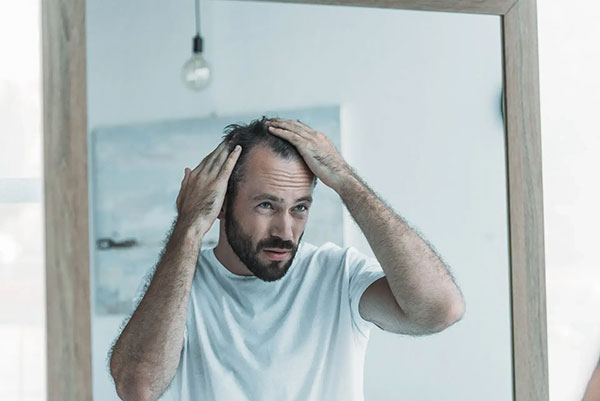Causes of hair loss in men

Hair loss is more than just a cosmetic issue. It can be an embarrassing condition and cause anxiety for men. Some hair loss is normal, but it's important to determine if your hair loss is due to a medical condition or other factors that require treatment. Here are some of the most common causes of male pattern baldness:
Genetics
Genetics is a major cause of hair loss. Male pattern baldness and female pattern baldness can be inherited from either side of the family. If your father, grandfather and brother are all bald, you’re more likely to lose your hair too. Genetics can also be passed on through adoption.
Aging
If you're losing hair, it's likely due to aging. Hair loss due to aging is called androgenetic alopecia. Androgenetic alopecia (AGA) is caused by a hormone imbalance that affects the hair follicles in genetically predisposed men. This type of male pattern baldness can be seen in about 30% of men by age 30, 50% of men by age 60, and around 80% of men by age 70.
It usually begins as a receding hairline, which may later progress to baldness at the top and crown of the head. While there are treatments available for AGA that can help slow down the progression or halt it altogether, they won't regrow lost hair—androgenetic alopecia is irreversible.
Male hormones
Male hormones, namely testosterone and dihydrotestosterone (DHT), are the culprits behind hair loss in men. They affect how your body produces new hair, as well as how it responds to stress and aging.
The amount of DHT your body produces depends on a few different factors: genetics, age, ethnicity and lifestyle choices like diet or exercise. Some people naturally produce higher levels of this hormone than others do; if you’re genetically predisposed to having higher levels of DHT in your body, then you're more likely to experience baldness at an earlier age than someone else who doesn't have these same genes. In addition to genetics and ethnicity—for example, Caucasians tend to be more susceptible than those with darker skin tones—the male sex hormone plays an important role when it comes down to determining whether or not someone will lose their hair before their 30s or 40s.
Medical conditions
There are a number of medical conditions that can cause hair loss, including:
- If you have an iron deficiency, your body may not have enough red blood cells to carry oxygen to your hair follicles. This can lead to thinning or balding over time.
- Some people with diabetes develop a condition called alopecia areata that causes patches of hair loss on the head and body.
- Thyroid disease. Hypothyroidism (low thyroid) can cause hair loss in men, as well as weight gain, fatigue and joint pain. Hyperthyroidism (high thyroid) also causes symptoms like weight fluctuation and sweating at night but may lead to baldness as well as facial swelling and rapid heartbeat.
In addition to these common medical conditions there are several rarer illnesses that may cause you or someone you know to lose their locks prematurely: lupus, tumours and cancer treatments such as chemotherapy
Medications
Medications are a common cause of hair loss in men. The most common medications that cause hair loss include:
- Prescription medications like blood pressure pills, antidepressants, and steroid injections.
- Over-the-counter drugs (for example, nonsteroidal anti-inflammatories such as ibuprofen)
- Antibiotics like tetracycline and doxycycline may cause hair loss by killing off the good bacteria on your scalp that keeps your skin healthy. When these bacteria die off, they can't produce sebum—an oily substance that prevents your skin from drying out—and you can get dry patches on your scalp with inflammation and itching if you don't wash regularly enough to remove dirt and sweat build-up without shampooing every day! This can lead to dandruff too!
Poor hair care
The first step to healthy hair is using the right shampoo. If you are not sure what type of shampoo is best for your hair, ask a dermatologist or hair stylist which one will work best for your scalp and hair type.
You should also avoid excessive heat on your head and use products that contain alcohol in them. Alcohol can dry out the scalp, causing it to produce more oil, which causes dandruff and other issues such as flaky skin. In addition, excessive heat from blow dryers or curling irons can weaken your strands over time and make it more likely for breakage to occur when styling with these implements in order to maintain a clean look with no flyaways!
There are many causes of hair loss
There are several known causes of hair loss. The most common cause is male pattern baldness, which affects about half of all men by the time they reach 50 years old. It's not an inherited condition and its exact causes aren't fully understood, but it may be linked to your genes and hormones.
Other possible reasons for hair loss include:
- Hereditary factors: Male pattern baldness usually runs in families.
- Age: Hair loss often begins after age 30 or 40, when testosterone levels start to decrease naturally (unless you're on a hormone replacement therapy).
- Medical conditions: Several medical conditions can cause sudden or gradual thinning of scalp hair including lupus, rheumatoid arthritis, thyroid disease, iron deficiency anaemia (a lack of red blood cells), chemotherapy treatments for cancer, radiation therapy treatment for prostate cancer and alopecia areata (a type of autoimmune disease), which can cause patchy baldness with no other symptoms
Conclusion
Hair loss can be a distressing experience, and it’s important to understand the causes. This will help you determine if the hair loss is temporary or permanent. If the cause is a medical condition, then treating the underlying problem may stop your hair from falling out. However, if genetics are at play or your hair care routine has been poor for years (and not just recently), then there probably isn’t much that can be done about it other than embracing yourself as bald or shaving off what remains of your locks now that they're gone!


